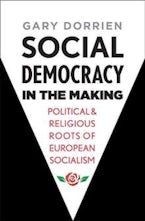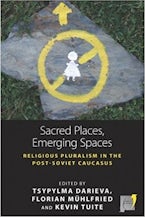- Home
- political science
- Social Democracy in the Making

Social Democracy in the Making
Political and Religious Roots of European Socialism
By: Gary Dorrien
600 Pages
- Paperback
- ISBN: 9780300236026
- Published By: Yale University Press
- Published: April 2019
$37.50
Gary Dorrien’s study, Social Democracy in the Making: Political and Religious Roots of European Socialism, describes the legacies of Christian socialism and Social Democratic politics in Britain and Germany from its birth in the 19th century until the mid-1960s with the declared goal to show that “social democracy is an ideology in its own right, distinct from orthodox Marxism and free-market capitalism” (xiii). Since, according to the author, the historic achievements of Social Democracy are “seriously underestimated,” it is important to understand “what it took to create modern standards of decency” (xiii). The “constructive purpose” of the book is to demonstrate that, unlike in Germany, where even though “Germany had the richest tradition in modern theology and Social Democracy” Christian socialism was less compelling and accomplished, in Britain “distinctly British cultural and historical factors enabled Christian socialists to be deeply involved in the making of British Social Democracy” (2).
Moreover, Dorrien takes a clear political stance arguing for decentralized economic democracy and anti-imperial internationalism and favoring the political and theological positions of specific theologians such as the Swiss Reformed Leonard Ragaz, the Lutheran Protestant Paul Tillich, and the Anglican William Temple.
The book is divided into six chapters. The first chapter describes the structure, premises, and objectives of the book and criticizes explicitly the trend within contemporary religious thought, to proceed as if “Christian socialism never happened and Carl Schmidt invented political theology” (3). The author already defines here the main differences between British socialism, which he describes as “pragmatic, nonideological, commonwealth-minded, open to clerics, sometimes romantic, and often middle class,” and German socialism, which in his view was from the beginning “ideological, anticlerical, and overwhelmingly proletarian” (3). Furthermore, Dorrien states that despite the difficulty to indicate a core unifying the many schools of socialism he believes the best candidate “for an essential ‘something’ in democratic socialism is the ethical passion for social justice and radical democratic community” (4).
The following chapters reconstruct the history of socialist theory and history by focusing on central figures, political parties, and organizations in Germany and Britain. The second chapter detects the origins of British socialism within Anglican socialism, early Marxism, and Fabian collectivism, while the third addresses the role of the Marxist tradition in the development of German socialist thought and the formation of German Social Democracy. The fourth chapter focuses on central figures of Swiss and German political theology, namely Herman Kutter, Lenard Ragaz, Karl Barth, and Paul Tillich. The book continues with a chapter entirely dedicated to the thought and political action of William Temple, R. H. Towney, and G. D. H. Cole and ends with a chapter that describes and analyzes the period in which British and German Social Democracy “morphed into a very similar form of revisionism” (409).
Throughout these six chapters, Dorrien describes and discusses an impressive number of themes, theses, conflicts, movements, currents, and contexts. To list just a few: Karl Marx’s “powerful and illuminating” critique of capitalism, his “dogmatic determinism, catastrophe mentality, and the doctrine of the proletariat” (5); the continuities and ruptures between Marx and Marxism; the mechanistic and evolutionary understanding of history within Marxism; the never-ending dispute about the legitimacy or illegitimacy of revolutionary violence as a means for the realization of a classless society; the origins and history of the British Labour Party and the Social Democratic Party of Germany (SPD); Karl Barth’s crisis theology and the lack of a “Marxian or even vaguely socialist account of structural economic forces” (269) in his thought; Paul Tillich’s “neo-Marxian form of religious socialism” (16); last but not least the complex relationship between Social Democracy and democratic socialism.
Dorrien treats all these issues without ever giving in to simplifications and offers the reader an overview of the complicated history of British and German Marxist, Socialist, Christian Socialist, and Social Democratic theory and practice. Nevertheless, the text is anything but easy and smooth to read. In the first place, the author's choice to describe and discuss one by one the life and thought of practically all of the most important figures in this history—and not to opt rather for a systematic and comparative treatment focused on the issues—makes the reading at times difficult and redundant.
Secondly, Dorrien amalgamates historical context, biographical information, analysis of important texts, disputes, and conflicts within and between different groups, currents, and parties in such a way that the reader feels drawn into a swollen river that flows without moments of respite. The text’s comprehension is made even more complicated by the fact that it is often difficult to distinguish between the description and analysis of the theses and arguments of the various figures and the use that Dorrien makes of these theses and arguments to expose his political position and thought.
Nevertheless, the book offers much inspiration for all those who are interested not only in understanding the intricate history of socialism—both secular and religious—and Social Democracy, but also to reflect on how past events have affected the current political landscape and ideological situation in Europe and more generally in the world. In this regard, it appears to me that there is a certain incongruity between Dorrien's declared intention to defend the project and legacy of Social Democracy and his critical exposition of what the latter became in the post-war period. It cannot be denied that Social Democrats “did not achieve democratic socialism, but they made significant advances toward it that had to be named and defended” (23).
But it is equally true that starting from the 1960s “the Labour Party and the SPD went to become so deeply integrated into welfare state capitalism that it is hard to see democratic socialist aspirations on both party mainstreams” (468). The distinction that Dorrien puts forward in the final chapter between the German and British models and the Swedish model of Social Democracy—which, with the Meidner plan, would mark “the difference between Social Democracy strategies that still fight for economic democracy and those that give up trying” (468)—only partially resolves the contradiction between the intention of the book and its critical exposition of the revisionism that has determined what today Social Democracy has become, not only in Germany and the United Kingdom but actually in all of Europe.
How can one not agree with Dorrien when he writes that “Democratic Socialism at its best expands the cooperative, public bank, and social market sectors, mixes various modes of social ownership, dismantles social privilege, male privilege, and heterosexual privilege, repudiated Eurocentric presumptions, and upholds an ethical commitment to freedom, equality, community, and ecological flourishing” (469)? The problem is: for decades no European Social Democratic party has been able to implement policies that concretely pursue these objectives. Social Democracy ceased to be a true alternative to capitalism at the moment when it repudiated, in theory and practice, the vision of a radically different society with a radically different mode of production.
Baldassare Scolari teaches Media Ethics at the University of Applied Sciences Graubünden (FHGR) and Research Methods at the Bern University of Applied Sciences (BFH).
Baldassare ScolariDate Of Review:January 15, 2021
Gary Dorrien is the Reinhold Niebuhr Professor of Social Ethics at Union Theological Seminary and Professor of Religion at Columbia University. His previous books include The New Abolition and Breaking White Supremacy. He lives in New York City.











